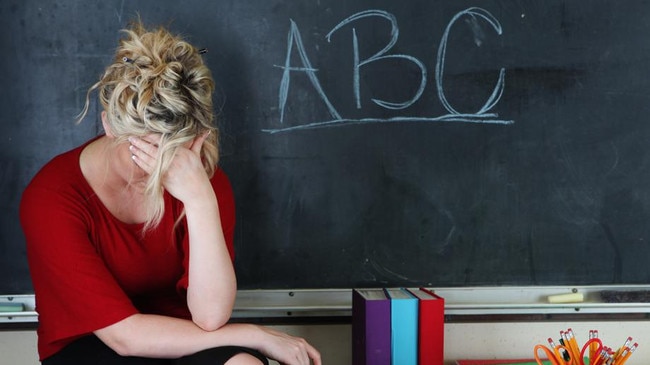Bosses demand better literacy, uni degree reforms
Employers have scolded schools for churning out semiliterate students, and demanded a new model to better train professional workers.

Employers have scolded schools for churning out semiliterate students, and demanded a new “degree apprenticeship” model to better train professional workers.
Traditional three-year university degrees are losing popularity, with early applications to start a degree in 2023 slumping as mature-age students learn on the job and more school leavers head straight to work.
The decline in domestic student enrolments has triggered a tertiary turf war, as regional universities accuse big-city sandstone institutions of “poaching’’.
The Australian Industry Group (Ai Group), representing 60,000 employers of 1 million workers, has warned that poor literacy and numeracy skills among workers is affecting three quarters of businesses.
It has told the Productivity Commission workers need to upskill through short courses known as “micro-credentials’’, which will qualify for student loans under federal government reforms.
Ai Group education and training director Megan Lilly said many school leavers – and even university graduates – have “inadequate skills’’ to work.
“There are definitely people who come from vocational and university education who lack the foundational skills they need to function properly in the workforce,’’ she said.
“We have a lot of very well-educated young people these days but we still have a considerable number who have literacy and numeracy deficits that impact … getting a job and maintaining a job. Apprentices often need to get literacy and numeracy support to enable them to complete their apprenticeship.’’
Ms Lilly said more businesses want a return to on-the-job training, combining work with short industry courses or part-time tertiary study.
She said “degree apprenticeships’’ were popular in Europe and would work well in Australia, for school leavers keen to “earn while they learn’’.
“There are such acute skills shortages that young people can pick up jobs and earn good money, so some companies are employing people directly and building a training program for employees,’’ she said.
“There should be more high-level apprenticeships and cadetships across the economy, like they do in Europe.
“We need a model of learning that is more relevant to the modern economy.’’
The Australian Information Industry Association, representing tech companies, also criticised the quality of some traditional university degrees.
“Graduates from IT (information technology) degrees are not job-ready,’’ AIIA chief executive Simon Bush said on Friday.
“It takes six to 12 months to train a graduate on the job to get productive and on the tools.’’
Mr Bush said IT employers were hiring Certificate III and Certificate IV vocational training graduates, who study for a year or two. “They’re not necessarily taking graduates with three- and four-year undergraduate degrees from university,’’ he said.
BAE Systems, a global engineering firm that specialises in defence, cyber security and virtual-reality technologies, will launch the first “degree apprenticeship’’ in systems engineering in 2024.
The Melbourne-based degree will involve Apprenticeships Victoria and Engineers Australia, although the partner university has yet to be revealed. Participating employers will include Dassault Systemes, Advanced Fibre Cluster, Air Radiators, Navantia Australia, Memo and Systra.
BAE Systems Australia has also partnered with the University of South Australia to kick off a degree apprenticeship in software engineering.
“It’s important that we look for new ways to work across industry and academia to collectively develop solutions that benefit the nation and provide alternatives for students who might not otherwise consider tertiary studies,’’ the company’s chief people officer, Danielle Mesa, said on Friday.
The push for work-based tertiary education comes as universities suffer a slump in enrolments for 2023. Applications to universities in NSW are the lowest in four years, with those lodged through the Tertiary Admissions Centre down 4.6 per cent from the same time last year. Victoria’s applications have dipped less than 1 per cent, but in Queensland mature-age applications have fallen 11.3 per cent and school-leaver applications are down 3.7 per cent.
Former Australian Catholic University vice-chancellor Greg Craven claimed prestigious universities are “plundering’’ disadvantaged students from regional and suburban universities to meet equity quotas for students.
“They are poaching socially marginal students from the regions and underprivileged suburbs, with scholarships and other sweeteners only rich institutions can afford,’’ Emeritus Professor Craven writes in Inquirer.
“They do not actually want these students, given their historic rationale for existence has been to invite only the elite. These newly privileged students will be academic cannon fodder. Sandstones have neither the interest nor the learning structures to cater for students beyond the north shore or the eastern suburbs.’’
Regional Universities Network executive director Alec Webb warned of a “hollowing out’’ of regional communities if city universities lure local students.
“While we respect student choice, regional universities are concerned about metro-centric solutions, and short-term incentives that could see a further hollowing out of regional communities,’’ he said.
“Taking the best and brightest from regional areas hollows out our regional workforces and obviously will have an impact on Australia’s economic prosperity.’’
The Group of Eight, representing the elite “sandstone” universities, said its academic success rate for disadvantaged students was “well above the national average’’.
“Allowing students to choose the university course that best suits their aspirations and skills is a core tenet of Australia’s approach to university study,’’ Go8 CEO Vicki Thomson said.
Federal Education Minister Jason Clare will require all universities to do more to help disadvantaged students as part of the University Accord, to be launched next week.
“I want more people from poor families, from regional and remote parts of Australia, more Indigenous Australians and more Australians with a disability going to all our universities,’’ he told The Weekend Australian.
The federal government allocated all 20,000 of its bonus university places in last month’s budget to disadvantaged students.








To join the conversation, please log in. Don't have an account? Register
Join the conversation, you are commenting as Logout